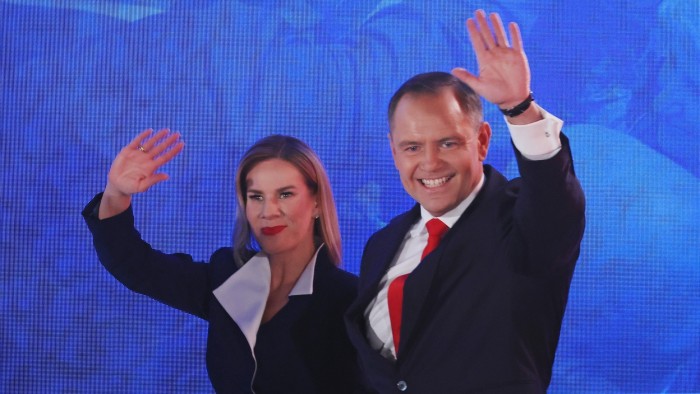Unlock the Editor’s Digest for free
Roula Khalaf, Editor of the FT, selects her favourite stories in this weekly newsletter.
The writer is editor-in-chief of the Polish weekly Kultura Liberalna and author of ‘The New Politics of Poland: A Case of Post-Traumatic Sovereignty’
On Sunday evening, Poland’s preliminary election results were announced based on an early exit poll, suggesting that the liberal candidate, Rafał Trzaskowski, had won. Congratulations began to pour in. Before midnight, however, it emerged that the populist candidate, Karol Nawrocki, had narrowly triumphed with 50.89 per cent. More than 10.5mn people voted for him; only the legendary Solidarity leader Lech Wałęsa received more votes, in 1990.
This is a major disappointment for supporters of liberal democracy in Europe. In 2023, a pro-European liberal, Donald Tusk, triumphed in Poland’s parliamentary elections. A coalition government was formed, which eagerly became involved in EU foreign policy. However, Tusk began to suffer from Gorbachev syndrome. Like the erstwhile Soviet leader, he gained popularity outside the country while his support dwindled at home.
When Tusk presented his party’s presidential candidate, the backlash came. The coalition government had neglected to communicate with citizens; Tusk contented himself with sending the occasional message on X. Voters reacted by treating Trzaskowski’s candidacy as an opportunity to register their disapproval of a government burdened by an image of sluggishness.
Many of the reforms promised in 2023 have not been delivered. The restoration of the rule of law has stalled. Abortion laws have not been liberalised. Tusk assumed that the electorate would understand that as long as conservative President Andrzej Duda was still in office, not much could be done in terms of legislation, thanks to Duda’s veto power. The gravity of these errors of procrastination and lack of communication was revealed during the campaign. Millions of voters voted not so much for Nawrocki (still a relative unknown) but against Tusk and his party.
But Trzaskowski’s defeat is important for two other reasons as well. It signals the death knell for any chance of restoring the rule of law after the era of populist rule. In 2015, there was a breach of the constitution by the Law and Justice party (PiS) and the unlawful appointment of additional judges to the Constitutional Tribunal. With each passing year, the legal chaos engulfed more segments of the judiciary. Now, Nawrocki will block any statutory initiative that aims to regulate the status of judges who were appointed during the PiS era.
Second, it will bring Warsaw’s infighting back out into the open. Nawrocki will demand a role in foreign policymaking and Poland’s internal disputes will once more play out on a global stage. These arguments reflect the increasing division between those who are liberal, pro-EU and committed to respecting alliances and those who are illiberal, anti-EU and partial to neo-imperialism. For countries like Poland, there are two wests: the liberal one in Brussels and the illiberal one in Washington.
The clash between these two models can be seen across Europe but is most acute in Warsaw, where a homegrown variant of Trumpism is winning. Whereas Trzaskowski sought to position Poland within a strong EU, Nawrocki gravitated towards the language and style of Maga so much that he even went to the White House for a Trump photo op.
As the war in Ukraine continues, the victory of a PiS-backed politician will put wind in the sails of populists across eastern Europe. But this does not mean that the right will triumph everywhere. Just as Tusk’s 2023 win did not signal the ultimate victory of liberalism over populism, Sunday’s loss does not signal the automatic return of PiS dominance.
Polish liberals may have lost at the ballot box, but their defeat took place within the framework of competitive democracy; the war for the shape of the political regime has not yet been lost. That’s why, as of today, Tusk should be preparing for the 2027 parliamentary elections — by returning to his liberal reform programme and the civil society coalition that brought him to power.
